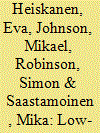| Srl | Item |
| 1 |
ID:
101434


|
|
|
|
|
| Publication |
2010.
|
| Summary/Abstract |
Grassroots initiatives for change rely on people with limited power, limited resources and limited ability to influence others. From this position, people acting from the bottom up can change their own actions, seek to influence others around them and seek to change the social structures that they inhabit. These acts are invariably conceived, initiated and enacted within communities, and there is an emerging interest from practitioner, policy and academic circles in the importance of community as a space for realising pro-environmental change. In this paper, we ask what role grassroots initiatives can have in creating low-carbon communities. Using a theoretical framework from work on community-based practice change initiatives, we discuss the interplay between grassroots action and community capacity. We then present two cases of grassroots low-carbon community initiatives in light of this theoretical work. We conclude by discussing key themes emerging from the cases, including the potential for grassroots initiatives to build community capacity for low-carbon practices, and the importance of locally crafted solutions according to the structures specific to place.
|
|
|
|
|
|
|
|
|
|
|
|
|
|
|
|
| 2 |
ID:
101450


|
|
|
|
|
| Publication |
2010.
|
| Summary/Abstract |
Previous attempts to change energy-related behaviour were targeted at individuals as consumers of energy. Recent literature has suggested that more focus should be placed on the community level and that energy users should be engaged in the role of citizens, and not only that of consumers. This article analyses different types of emerging low-carbon communities as a context for individual behavioural change. The focus is on how these communities offer solutions to problems in previous attempts to change individual behaviour. These problems include social dilemmas, social conventions, socio-technical infrastructures and the helplessness of individuals. Different community types are examined, including geographical communities as well as sector-based, interest-based and smart mob communities. Through four case studies representing each of these community types, we examine how different communities reframe problems on the individual level to reduce carbon emissions. On the basis of an analysis of the strengths and weaknesses of various community solutions, implications are drawn for further research and for the design and support of low-carbon communities
|
|
|
|
|
|
|
|
|
|
|
|
|
|
|
|